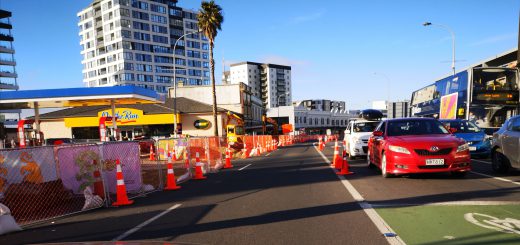Too bloody big for its boots – Auckland Council arrogance sparks citizens’ backlash
After years of disruptive change, rates and user charge increases, and various scandals, Auckland really did need a period of political stability and civic calm. But no. Last November, the Council’s Unitary Plan committee, in secret meetings led by deputy mayor Penny Hulse and committee chair Alf Filipaina, supported by three other councillors and an unelected Independent Maori Statutory Board member, pushed through massive changes to the Proposed Auckland Unitary Plan. In a series of narrow votes, two on the casting vote of the chair, nearly 30,000 properties (more than in the original Unitary Plan) were ‘up-zoned’ across Auckland. Most of these are on the isthmus, including parts of the Waitemata & Gulf Ward, notably Westmere and to a lesser extent Parnell. In 2013, supported by Shale Chambers and Waitemata local board members I successfully battled to protect these single house townscapes (along with most of Grey Lynn) from intensification in the first version of the Unitary Plan.
This time there was no notice, no warning, no right for affected property owners to be heard or make submissions. The principal target for council planners was the single house zone – one or two storey homes on traditional lawn and garden sections. Thousands of householders who believed themselves safe from the original notified Unitary Plan changes, and who therefore did not make a submission, found that their homes and neighbourhood zonings had been suddenly changed ‘out-of-scope’ to allow for mixed-use, town houses and apartment buildings. Thousands of other single house owners whose properties escaped the planners’ latest attentions suddenly found themselves living very close to future high-rise buildings, often with possible loss of cherished views and even sunlight. On top of this – schools and their playing fields across central Auckland have also been zoned for intensification, incentivising the development of even these islands of open space (and therefore putting more pressure on public parks).
Once the full implications of the changes filtered out there were widespread outpourings of public anger. The interests and civil rights of Auckland ratepayers, betrayed by their own council, were taken up by a group of concerned citizens, ‘Auckland 2040’, whose indefatigable chair Richard Burton is a public hero. ‘Auckland 2040’ experts maintain there is already sufficient capacity in the Unitary Plan to cater for major population growth. Indeed, as an example there are 54 apartment developments currently underway in central Auckland.
The council’s massive un-notified change to zonings is essentially another example of business deregulation, which would make Auckland even more of a free-for-all for the development lobby. Interestingly some young ‘climate change’ activists lined up with big business to support the changes. ‘Generation Zero’ argues that the all-out assault on the historic garden suburbs of Auckland is a good for young people, taking as an article of faith vague promises from the developers of ‘affordable housing’ close to the desirable city centre. They also believe a further round of intensification will force more people to use public transport. Sadly they have bought into the endless growth ideology and are not too bothered about the wider environmental impacts of overcrowding (sewage disposal for instance) nor indeed, as they freely admit, about the loss of people’s democratic rights and due process.
The weird assumption that unsustainable growth and urban overcrowding is the formula for quality of life and better public transport ignores the fact that in 1956 when Auckland’s population was below 300,000, incidentally a time when nearly all Aucklanders lived in single houses, public transport patronage was over 100 million trips per year. 80 million of those trips were on Auckland’s electric tram system built in 1904 when the population was less than 100,000. Now Auckland’s population is 1.5 million and despite the injection of massive amounts of ratepayer/taxpayer cash, public transport patronage is still only 80 million trips per year. However this assault on due process and property-owners’ rights cannot be blamed on a handful of bloggers and misguided activists.
The real pressure for the un-notified changes is coming from the powerful vested interests led by the NZ Property Council – the arch lobbyist for big developers, supported by the board of Housing New Zealand and foreign-owned Fletchers. Awkwardly in 2011 the Auckland Council which is meant to be the statutory planner and regulator, decided to become a member of the NZ Property Council. With its CCO’s it is now the biggest fee-paying member. For a regulator this is a massive conflict of interest.
Mayor Len Brown claims the Unitary Plan changes had the full backing of the government. As a matter of fact this government has had a most unusual degree of influence over the Unitary Plan and the detested SHAs. In other parts of New Zealand and in Auckland prior to the Super City, regional and district planning was solely a regional council and city/district council responsibility. But in the case of the Auckland Unitary Plan, the government put it in place special fast-tracking legislation and government ministers appointed key members of the ‘Independent Hearing Panel’. Ministers also appointed the private sector directors on the board of Housing New Zealand, whose tax-payer funded lawyers are hard-line allies of the NZ Property Council before the hearing panel. That being said, what Len Brown seems to have forgotten is what John Key personally told him at a joint meeting between the Governing Body and cabinet ministers last July at which I was present. At that meeting the prime minister advised the council to exercise restraint in imposing more intensification and high-rise on what he called the ‘leafy suburbs’ of Auckland. The council chose not to take this sensible political advice and pushed ahead with its secret plans.
This is another case of council arrogance but this time it over-reached itself. The public outrage set off a councillors’ revolt. Last Wednesday at a marathon extraordinary meeting of the council’s Governing Body, before a packed and vocal public audience, a majority of councillors overruled the unconvincing advice of senior planners and lawyers, swept aside the protestations of Mayor Brown and deputy mayor Hulse and voted to dump the undemocratic changes. I was proud to be among them.
This article appears in the Ponsonby News March 2016 edition



